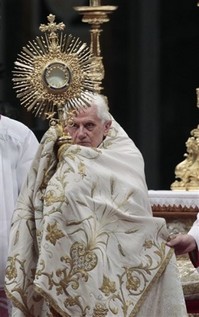The Church, through the ministry of Pope Benedict XVI, canonized the first Native American woman today. The Church made an infallible statement in proclaiming before the world that Kateri Tekakwitha (1656-1677), from the Mohawk Indian tribe,

Kateri Tekakwitha (Photo: razzumitos)
is in fact with God, a saint. Also canonized was Marianne Cope.
Hers was a
common Catholic spirituality. Her way of living the Christian life is what is expected of all the baptized is the clearest link to Christ for us today. Saint Kateri was known to be a contemplative; a woman concerned to live the virtuous life; faithful to the Truth she received through Baptism and nourished by the reception of Confession and Holy Communion. Saint Kateri was recognized to be close to Jesus, a fact that was only possible because she spent time with the Eucharistic Lord in Adoration of the Blessed. Further, she was never without the Rosary. And she fasted for her own sins and the sins of her people. Penance was not uncommon to Saint Kateri.
At her intercession, God healed a boy from Washington state who had acquired a flesh eating bacteria. This was the miracle that allowed the Church to discern Kateri’s sanctity. On December 19, 2011, Pope Benedict XVI accepted the validity of the Congregation for Saints’ findings. Curious to note, Pope John Paul II didn’t require a miracle for Kateri to be beatified.
As a subtle point of clarification, in the Americas, Saint Juan Diego is the first Native person to be canonized and Kateri is the second. The current thinking is that in the USA, Kateri is the first Native person raised to the altars.
The National Shrine is in Fonda, NY.


